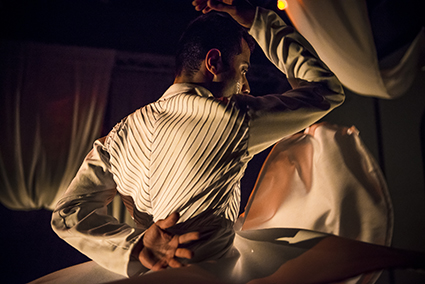An alchemical progression
Jodie McNeilly: Raghav Handa, Tukre

Raghav Handa, Tukre, FORM Dance Projects
photo Gregory Lorenzutti
Raghav Handa, Tukre, FORM Dance Projects
A softened hum, chant-like, without the intensity or expectation of a chorus to come. Investment in an activity, a small ritual taking place. Low light, ember glow. Small metal objects. Is it a lamp? Somewhat tarnished, I taste rust in my mouth, a quasi-synaesthetic response I have when seeing gold plate in old cathedrals. Rituals confuse the senses.
Rubbed together, these metals make a bearable sound such as industry should make. The rhythm picks up as Australian choreographer and performer of Indian heritage Raghav Handa, with sharpened, precise actions, appears to handle ‘some’ past, while promoting the whiff of a future foretelling: what to expect?
Taking this initial motif, he makes it larger to establish a pattern with slides, criss-crossing forearms, slicing forward and backward—and again. It is a slide between movements’ own Archimedean points: deliberate, aware, no hesitation. The fixed geometry widens after each stroke, opening history and space, waking us from a pinhole presence.
In a big black box, Clytie Smith lights the way with perimeters and planes. There is a sense of growing the movement from the elemental to a larger more complex form. It is extracted from these illuminated hollows and bands, eventually rounding out to explicitly show Handa’s “movement language (of) circular and linear movement patterns.” The relationship could not be clearer.
The sound by Lachlan Bostock is a constant friend to Handa whether sparse or complex in its poly-rhythms and speeds. The tabla sound and rhythm explored through voice and drum, buoyant and crisp upon the flow of strings and electronic instrumentation: movement and music, inextricable.
We are introduced to Handa’s mother Sashi who, seated in a blue dress, looms large over the stage, a spectral figure, sharply projected onto suspended white fabric (filmed by Martin Fox). With a gentle voice, she calls to her son across the seas, the borders and centuries. We come to understand the Indian family tradition and economy of jewellery making, the craft of stone and gem cutting and the melting of metals. The autobiographical places itself on stage as softly as Handa’s floating mother. She tells us of her wedding—heavy with the weight of all that gold.
Handa reminds us (not so gently) that in Australia he is unable to marry his partner (the great shame of this country’s deepened homophobia: a duplicitous celebration of certain stereotypical queer identities while not wholly supporting basic civil rights). We also feel his dislocation from the familial traditions of India, a country that legislates in like manner. Handa, stuck, shuttling between two deprivations in his cultural mobility, without the weight of gold, pairs his hands like two small creatures and plunges them into a ribbon of light bracing the sides of the stage. Fingers rapidly traverse without iconic gesture, from left to right, a ball of symmetrical energy in a fight or frantic mating scene. Handa supports these fingers of fury and fright with a puppeteer’s grace. Graceful he is. Pure even. Spinning and whirling between the tumbling white fabric and, at one time, beneath white robes that whip the air and spin the body like a rip cord, knee traced high into attitude: a balanced display of his signature movement qualities.
The dance is a metallurgical progression: movements extracted and extruded from the elemental, melting and melded, rounded out and sculpted into a family heirloom, subsistence, a way of life, an identity. A work of integrity and pleasure in the moving body that makes one want to move too. We have seen the light, and now I look forward to seeing Handa negotiate less gentle forces with this vocabulary.
FORM Dance Projects, Tukre, concept, choreography, performance Raghav Handa, cultural consultant, performer Sashi Handa, sound design Lachlan Bostock, lighting Clytie Smith, dramaturg Martin Del Amo, film, projections Martin Fox, costume Marissa Yeo, Pheonuh Callan; Riverside Theatres, Parramatta, 29 April-2 May
RealTime issue #127 June-July 2015 pg. 35






